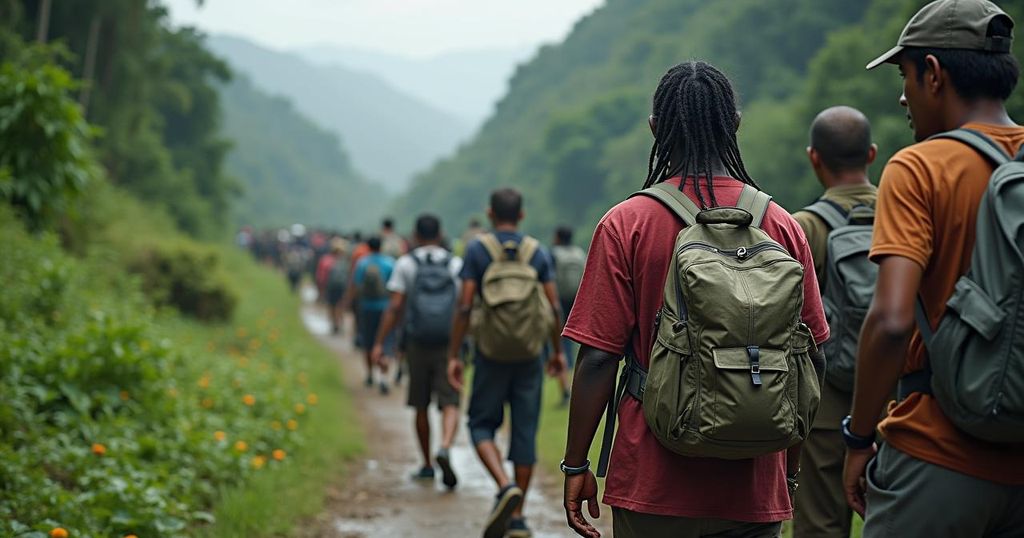Increase in Migration Through the Darién Gap: Venezuelans Lead the Surge Post-Election
In September 2024, migration through the Darién Gap saw a sharp increase, primarily led by Venezuelan migrants following their country’s contentious elections. Despite a 36% overall decrease in migration this year compared to 2023, over 25,000 migrants crossed in September alone, indicating a surge linked to political repression in Venezuela. The situation is exacerbated by reduced humanitarian support due to the suspension of aid organizations, highlighting the ongoing crisis faced by migrants in the region.
In September 2024, migration through the perilous Darién Gap, which stretches between Colombia and Panama, surged markedly. Reports from the Panamanian government indicate a particularly notable increase in the number of Venezuelan migrants following their country’s controversial presidential election held on July 28, 2024. According to Refugees International, this escalation in migration is a direct consequence of intensified repression within Venezuela after the elections, prompting many to seek refuge elsewhere. As of this year, more than 277,000 migrants have traversed the Darién Gap, a 36% decrease compared to the same timeframe in 2023. However, September saw a significant uptick with over 25,000 migrants crossing, representing a 51% rise from August, the majority of whom were Venezuelan. Other nationalities included Colombians, Ecuadorians, and even migrants from further afield such as Bangladesh and China. Panama’s President José Raúl Mulino, who assumed office on July 1, proposed measures to mitigate migrant influx, including the closing of certain access points. Despite intentions to strengthen repatriation efforts in partnership with the United States, the plan has not effectively included Venezuelans due to strained diplomatic relations following the election dispute, leading to halted flights between Venezuela and Panama. Moreover, humanitarian support for migrants has diminished significantly in Panama. The report by Refugees International indicates that upon exiting the Darién, migrants face a lack of aid, exacerbated by the suspension of Doctors Without Borders (MSF) from the region in early March due to a lapse in their agreement with the Ministry of Health. Recently, MSF announced the resumption of their medical assistance at the Lajas Blancas reception station following recent governmental approval. Throughout the preceding year, they provided medical care to over 72,000 migrants, underscoring the essential services that are being diminished amidst this escalating crisis.
The Darién Gap is a treacherous jungle corridor that separates Colombia from Panama, infamous for its challenging terrain and perilous conditions. With a significant uptick in migration in recent years, particularly from Venezuela, the area has seen rising numbers of individuals attempting to cross for various reasons—predominantly to escape political and economic turmoil in their homeland. The Venezuelan crisis has intensified following the questionable elections of July 2024, affecting both outflow and the conditions faced by migrants. Limited humanitarian aid and political tensions complicate this situation further for those seeking refuge along their perilous journey through the Darién Gap.
The steep rise in migration through the Darién Gap in September 2024, predominantly led by Venezuelans, reflects ongoing political turmoil and deteriorating conditions in Venezuela post-election. Although the Panamanian government has initiated measures to reduce migrant flow, they have failed to effectively address the underlying causes of migration or provide sufficient humanitarian support. The resumption of aid from organizations such as Doctors Without Borders is critical in addressing the urgent needs of migrants navigating this challenging route, despite the overarching challenges that remain.
Original Source: apnews.com




Post Comment